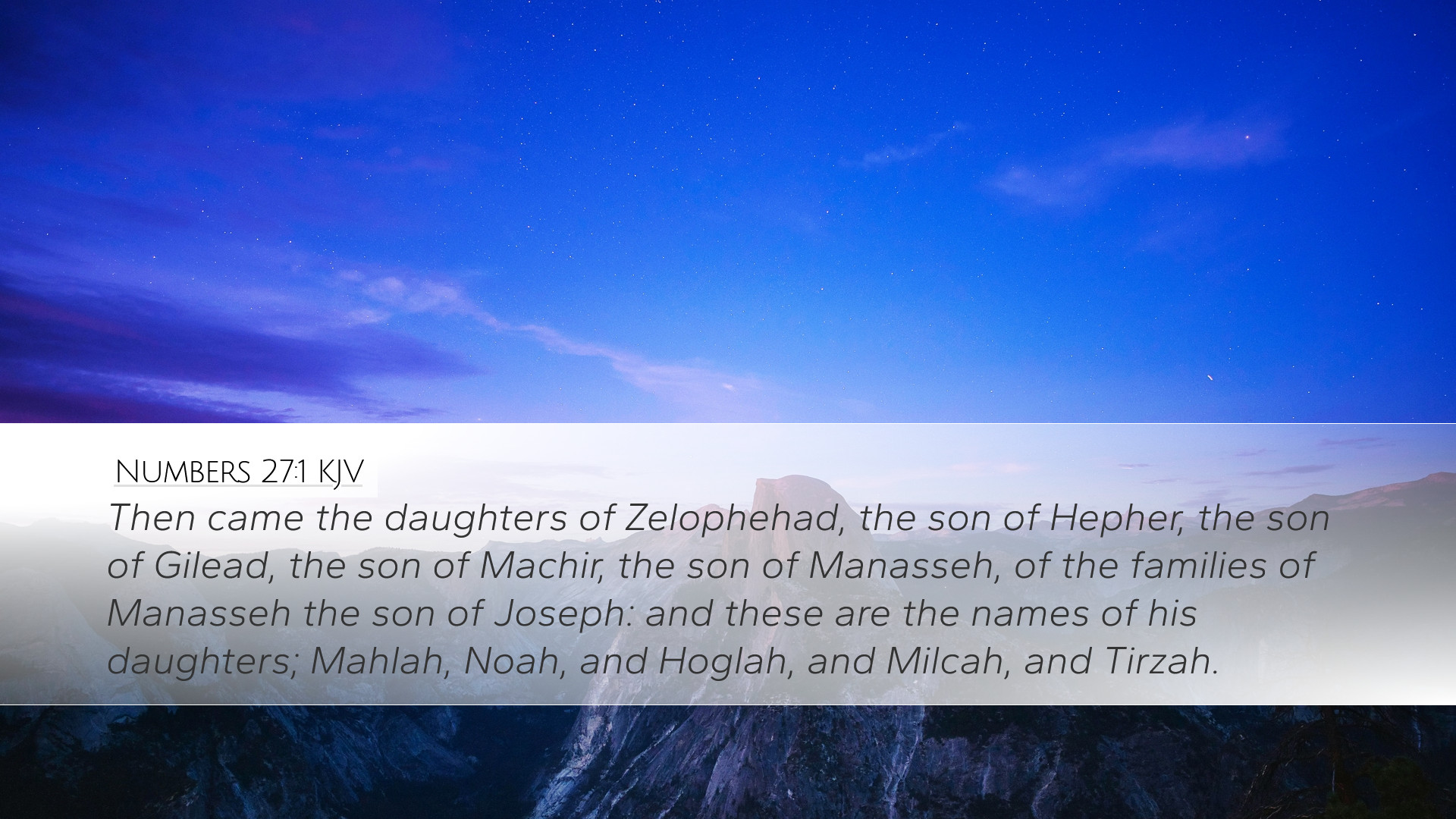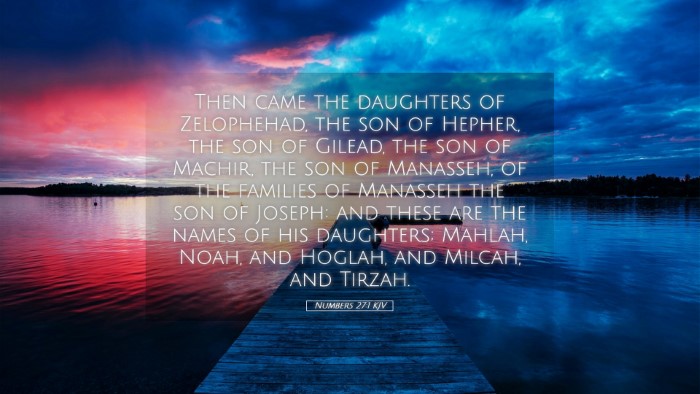Commentary on Numbers 27:1
Bible Verse: "Then came the daughters of Zelophehad, the son of Hepher, the son of Gilead, the son of Machir, the son of Manasseh, of the families of Manasseh the son of Joseph: and these are the names of his daughters; Mahlah, Noah, and Hoglah, and Milcah, and Tirzah."
Introduction
This passage marks a significant moment in Israel's journey through the wilderness, highlighting issues of inheritance, gender, and God's justice. The daughters of Zelophehad challenge the norms concerning inheritance rights, setting a precedent for future generations. This commentary synthesizes insights from various public domain commentaries, providing depth for theologians, pastors, and students of the Scriptures.
Contextual Background
The book of Numbers encompasses the experiences and laws given to the Israelites during their wilderness wanderings. It deals with organization, leadership, and many of the moral and social questions that arose as a nation formed under God's covenant. In particular, Numbers 27 reveals God's concern for justice and equity, even as it pertains to women in a patriarchal society.
The Protagonists: The Daughters of Zelophehad
These daughters—Mahlah, Noah, Hoglah, Milcah, and Tirzah—represent more than just their names; they symbolize a challenge to the prevailing customs of their time. Matthew Henry emphasizes their courage, noting that they approached Moses to seek their rightful inheritance based on justice rather than custom.
- Historical Significance: The daughters were motivated not merely by personal gain but by a desire for recognition of their deceased father's name and legacy. Their request arises from a deep understanding of the covenantal promises of land to Israel.
- Theological Implications: This episode illustrates God's advocacy for justice and highlights that His promises extend beyond societal norms.
The Nature of Their Request
The request made by the daughters was unprecedented; it demonstrated legal acumen and biblical faith. Albert Barnes notes that their desire for inheritance was not only a legal matter but a theological assertion of God’s faithfulness to His promises.
Elements of Their Petition
- Personal Claim: They appealed to Moses directly, rather than relying on tradition or the male members of their family.
- Legacy Preservation: They sought to secure their father’s name within the tribal lineage of Manasseh.
- Covenantal Context: They emphasized that their request was in accordance with the inheritance laws established by God.
Moses' Response and God's Verdict
Moses took their case before God, showing humility and dependence on divine wisdom. Adam Clarke comments on this interaction, emphasizing that Moses recognized the validity of their request and sought God’s guidance on the matter. The divine response affirmed their claim, signifying a turning point in the recognition of women’s rights.
God's Declaration
- Divine Approval: God instructed Moses to grant their request, affirming the value of their plea for justice.
- Precedent Setting: This event led to a broader application of inheritance laws that included daughters—a profound shift in societal norms.
Theological Insights
This passage invites profound theological reflection on several issues:
- Justice and Equity: The narrative shows that God's laws are designed for the fairness and equity of all members of society, regardless of gender.
- God's Sovereignty: God's immediate response to the daughters’ request illustrates His active involvement in human affairs and commitment to justice.
- Legacy and Identity: The attention given to the names of the daughters echoes the significance of heritage and identity in God's plan for His people.
Application for Today
For modern believers, this Old Testament passage holds several vital applications:
- Advocacy for Justice: Just as Zelophehad's daughters sought justice, today’s believers are called to speak out against injustice and advocate for marginalized voices.
- Recognition of Women's Roles: The text challenges the contemporary church to recognize and affirm the roles and contributions of women in ministry and society.
- Faith and Action: The proactive nature of the daughters encourages believers to take bold steps in faith when seeking God's promises and justice.
Conclusion
Numbers 27:1 encapsulates a moment of divine justice where God affirms the voices and rights of women. This interaction not only highlights the daughters of Zelophehad's courage but also signals a significant change in societal norms regarding inheritance and gender equality. It stands as a testimony that God values every individual and is committed to justice for all His people. As we reflect on this passage, may we be empowered to embody these principles in our lives and communities.


